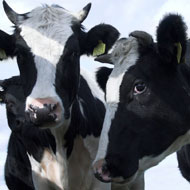Cows' eyes reveal how they are feeling

The study proved that cows's show visible signs of pleasure at being stroked by someone they know.
The whites of a cow's eye might tell us how relaxed they are, according to a study by World Animal Protection.
Published in the journal Physiology & Behaviour, the study looked at whether the amount of white visible in cows' eyes can tell us how they are feeling.
Existing studies show that when cows are frustrated or scared, the whites of their eyes increase. However, scientists have found the opposite to be the case for when cows are relaxed or calm.
Thirteen cows took part in the study and were observed for almost 400 separate 15-minute periods. The scientists filmed the cow's eyes before, during and after they were stroked for five minutes. Afterwards, the footage was analysed to record the amount of eye white that was visible throughout the observation.
Their results revealed the amount of eye white visible decreased when the cows were being stroked. This has led scientists to suggest that visible eye whites could indicate how relaxed cows are feeling.
Helen Proctor from World Animal Protection, said: "Many people often forget that animals have an interest in feeling good, and not only being free from pain or fear. Developing measures of positive emotions in animals is really important, as it enables us to understand how they are feeling. It also helps us to know which experiences and environments make them feel good.”
It is hoped that the study, along with previous studies on ear postures, will prove that not only do cows's show visible signs of pleasure at being stroked by someone they know, but that it is possible to measure positive emotions in cows.
Furthermore, the study is also hoped to be of use when working with the dairy industry in their programmes and understanding of cows.



 The latest
The latest